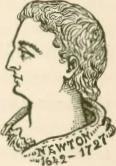HISTORIC GROWTH OF MAN.
experience of it we find the mass of the population in Christendom struggling for bare existence, like ravenous brutes in their scramble for food?"
With eighteen centuries in which to do its work, the Christian Church stands to-day and confesses itself helpless before the great evils that curse the world. Like the statesmen themselves, the church has no remedies to offer. It stands dumb before the problems of labor and capital, of crushing poverty and widespread crime. Its leaders seek to justify their indifference and ignorance by falsely quoting the words of Christ to Pilate, " My Kingdom is not of this world." What he did say was, "My Kingdom is not of this Order (kosmos) ;" it could not, like the Roman, be established and maintained by the sword, by physical force. It must rest on the Truth instead. Therefore Pilate said to the Jews: "I find no fault with this man. He is not guilty of sedition, of getting up a rebellion against the Roman arms, as you have charged against him." Christ told his disciples to pray "Thy Kingdom come on the earth." And the Bible does not say anything about a " Spiritual Kingdom" in distinction from a literal or material one. Christ was to "sit on the throne of his father David," and certainly that throne was civil and political, as well as religious, in its legal and actual functions.
SEMITIC INFLUENCE. In the twelfth century, when the Christian Crusaders from Europe came in contact with Arabian science and learning at Jerusalem, it stimulated them anew to the study of science. In the south of Europe, the Jewish and Arabian scholars who had come through Spain, lighted the fires of science from that direction. Thus it was the
AGE OF SCIENCE. 41
influence of Semitic thought that roused Europe from the intellectual slumber of the Middle Ages. In astronomy, physics, chemi try, medicine and mathematics, the long list of illustrious men of that race prepared the minds of Europe for its age of
intellectual maturity.
AGE OF SCIENCE. From the fif
teenth to the nineteenth centuries the discoveries of Copernicus, Columbus, Galileo, Kepler, Newton, Harvey, Dalton, Cuvier, Gall, Mayer, and a host of other great minds paves the way for a new civilization. In that vast evolution of knowledge the
scholars of Italy have taken no small part. But the Italian race itself had been changed from the old Roman by the infusion of new blood from other races. In the fourth and fifth centuries of our era the invasion of Italy by the Goths, Vandals, Huns and others resulted in the political fall of Rome. But Italy gained more than she lost. The new mixed race of Italians turned their thoughts to the conquests of art and science. It was Gothic blood, and not simply the old Roman, that stirred the genius of Giotto, Raphael, Michael Angelo, Titiano, Galileo, Torricelli, Visalius, Galvani, and many others high on the roll of fame.
It is very true that the vast growth of modern science has taken place in Christian countries. But this growth has not been stimulated or fostered by the church or its leaders. For the church, whether Catholic, Protestant or Greek, has sought to divorce religion and science as widely as possible. And
r
